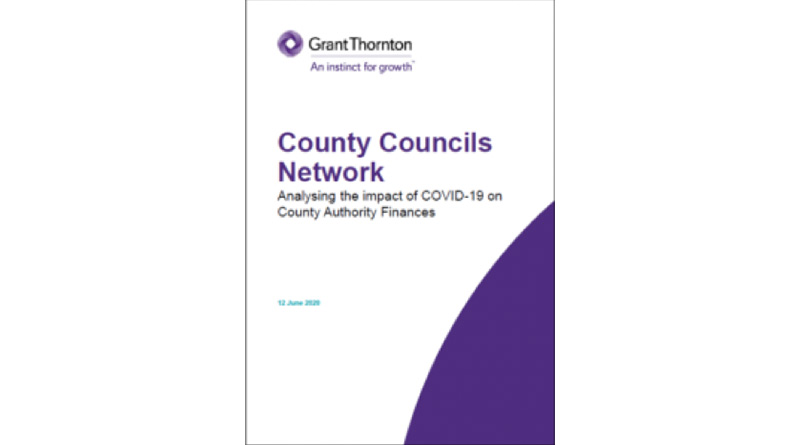Analysis Reveals Councils Face Unsustainable Coronavirus Deficit
A new report outlines the financial impact of Coronavirus on councils, which could run over several years, leaving England’s largest local authorities in an unsustainable position.
The study, carried out by leading business and financial adviser Grant Thornton UK LLP, and based on data provided by county and unitary authorities, shows that all 39 of councils included in the study could use up their available reserves in 2021/22 to cover a funding shortfall of £2.5bn. The report sets out that England’s largest councils could be facing the prospect of ‘large scale reductions’ in services to set legal budgets this year.
The report shows that county authorities will be particularly vulnerable to the fiscal impacts of a second wave of Coronavirus later, should this happen later this year, and a further outbreak and lockdown could increase the funding shortfall they face to an estimated £4.5bn over the next two years.
The County Councils Network (CCN), who commissioned the study, says that the report provides robust evidence to Government on the financial challenges facing local government as a result of the pandemic. CCN says that Ministers are ‘alive’ to the challenges, and they want to work with government to design a ‘comprehensive’ plan to prevent these forecast scenarios becoming a reality.
Using data provided by county and unitary authorities on estimated cost pressures and lost income resulting from the crisis, alongside projections on future revenues and legacy costs, Grant Thornton modelled the potential financial impact across three scenarios stretching to 2025. The analysis showed:
- County authorities face a funding shortfall in 2020/21 of £752m due to COVID-19, which could be as high as £1.3bn. However, in the event of a second wave of the pandemic later this year could cause this to rise to £1.9bn, with councils having to spend more on Coronavirus-related costs whilst losing income from services. Due to this shortfall a ‘significant number’ of county authorities could exhaust their usable reserves this year, meaning they could face in year cuts to services to prevent insolvency.
- Lost council tax payments, business rates and ‘legacy costs’ – such as continuing costs in adult social care – as a result of the pandemic could create an additional funding shortfall of £1.8bn, which could be as high as £2.6bn. This includes a £1.1bn loss of council tax and business rates income, which could become a recurrent shortfall over the next few years if no guarantees on protecting councils against these shortfalls are forthcoming.
- Although these deficits would largely affect council budgets in 2021/22, local authorities would need to anticipate this potential lost income this year and decide where cuts to services must be Without further support, all 39 councils could have depleted their available useable reserves by 2021/22. As a result, a significant number of these councils will be unable to balance their budgets and would have to enact further service reductions to prevent insolvency.
Based on the financial projections, Grant Thornton observe that the projected financial pressures are not sustainable for a significant number of county authorities within their available financial resources, even if measures were taken to reduce costs.
The report states that there is a risk that a significant number of councils will be forced to enact large scale service reductions and, as a last resort, issue a section 114 notice in the current year to meet their statutory duty to deliver a balanced budget in 2020/21 and 2021/22.
The report also suggests that it is necessary for the government to develop further packages of financial support and flexibilities as part of a wider medium-term plan to ensure that councils are adequately funded in the future and to prevent the forecasts on reserves being exhausted becoming a reality.
It suggests that these measures could include further emergency funding to meet the immediate shortfall in funding in 2020/21, and an income guarantee to prevent the accumulation of lost council tax and business rates impacting council sustainability from 2021/22 onwards.
Cllr Carl Les, finance spokesperson for the County Councils Network and leader of North Yorkshire County Council, said:
“Councils across the country are grappling with increased cost pressures in adult social care and other core local services, whilst facing huge reductions in income due to the lockdown and the country entering a recession.
“Grant Thornton’s analysis, based on council estimates on costs and their informed assumptions on how additional costs and lost revenue could develop over the short and medium term, show a significant funding gap opening up for county authorities due to the pandemic. This research shows the challenges facing county authorities and the severity of the potential impact on councils’ sustainability and provides important insights to inform government policy.
“Building on this evidence, we want to work with government to develop a comprehensive plan to support councils over the coming months and years. We know ministers are alive to the challenge and hope this report is a valuable contribution to informing future interventions to support all councils.”






